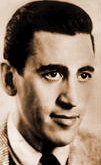
Philip Terzian
No one is required to be polite to his or her admirers; but writers, including journalists, invite a certain scrutiny, and the act of publishing involves the surrender of some privacy. This produces, in some cases, paradoxical reactions. Ernest Hemingway was notoriously resistant to biographers, but no modern writer so valued celebrity standing. And Salinger's hermit status has a certain ostentation. I am very far from being a best-selling novelist, but I get my share of mail, and the occasional unsolicited phone call. Appearances on television mean a higher volume of mail, and the disconcerting business of being recognized by strangers. For those to whom this is disagreeable, the solution is obvious: a low profile, and capacious wastebasket.
http://www.jewishworldreview.com --
BOOK REVIEWERS are not happy with the latest kiss-and-tell memoir of J.D. Salinger,
Dream Catcher,
by his 45-year-old daughter, Margaret. And Margaret, who has not spoken to her father in the two years since she told him she was writing a book about him, is not likely to be welcomed with open arms at the home of the famously reclusive novelist, in Cornish, N.H.
While she professes to love her father, and has fond recollections of growing up in his home (until she was packed off to boarding school at age 12), writing
Dream Catcher
was clearly an act of retribution. For that, says one writer in The Washington Post, it is "an unattractive and unwelcome book . . . [that] invades the author's father's cherished privacy to the point of disloyalty and exploitation."
As everybody must know by now, the author of
The Catcher in the Rye
is not just pathologically reticent, but decidedly peculiar as well. According to his daughter, his bedroom and bathroom at home are locked to keep members of his family at bay. He is sickened by pregnant wives, sexually attracted to waif-like young girls, and drove at least one spouse (Margaret's mother) to attempt to kill herself and her daughter. Over the years, Salinger has immersed himself in pop spirituality, from orgone boxes to Scientology to swamis and ESP. Like my favorite Indian prime minister, the late Morarji Desai, he went through a phase of drinking his own urine as an act of self-purification.
Salinger's dilemma, of course, is shared by famous people who guard their privacy with zeal: His bizarre conduct, and fierce defensiveness, merely tantalize inquirers. When a sympathetic biographer, Ian Hamilton, sent the galleys of his book to Cornish for approval, Salinger sued (successfully) to block the inclusion of letters, and tried (unsuccessfully) to prevent publication. The village of Cornish is besieged by pilgrims and disciples.
To some extent, of course, Salinger's reticence is understandable. I am not one whose adolescence was transformed by reading
The Catcher in the Rye
-- I thought the book was amusing, but its hero, Holden Caulfield, an idiot -- yet it has acquired a cult following in the half-century since it was published. Some of its most fervent fans are clearly unbalanced, and a surprising number of modern assassins -- John Hinckley, Mark David Chapman, Arthur Bremer, among others -- were found to have it in their possession.

Salinger
Salinger's problem, however, is more complicated. By his own particular conduct, he has made himself more vulnerable. Critics were similarly offended by Joyce Maynard's self-serving 1998 memoir,
At Home in the World
, which revealed details of her sad, year-long affair with Salinger. I would not wish to have my emotional life and sexual practices exposed to the world in old age -- or at any time, for that matter. But when a 53-year-old man seduces a self-absorbed, self-infatuated 18-year-old writer -- inducing her to abandon Yale and join his psychotic household -- the other shoe, at some point, must inevitably drop.
The same might be said for Margaret Salinger's memoir. Writing is a distinctly contemporary form of therapy, and memoirs are the therapeutic vehicle of choice. People who purchase
Dream Catcher
are probably more interested in what it reveals about J.D. Salinger than anything they learn about the author and her problems. But it is painfully evident that Salinger is not just a supremely eccentric individual, bordering at times on lunacy, but a singularly atrocious husband and parent, yelling and berating, playing cruel jokes, and treating his captive family with monstrous indifference. That one of his victims should retaliate is unfortunate, but scarcely surprising in a therapeutic world.
As a matter of principle, the dynamics of the Salinger family should be nobody's business but the Salingers'. But one of his gurus might have spared Salinger much trouble by quoting W.H. Auden's quatrain about another kind of tyrant: "I and the public know/What all schoolchildren learn,/Those to whom evil is done/Do evil in return."
JWR contributor Philip Terzian is associate editor of The Providence Journal.
Comment by clicking here.
08/31/00: A Golden Age that never was
08/28/00: Blame communism, not Russia
08/24/00: Social progress on one front, regression on the other
08/21/00: The beat goes awry
08/17/00: The unwelcome democrat
